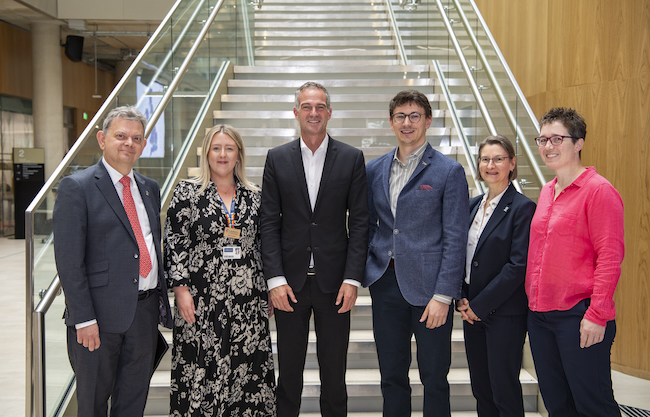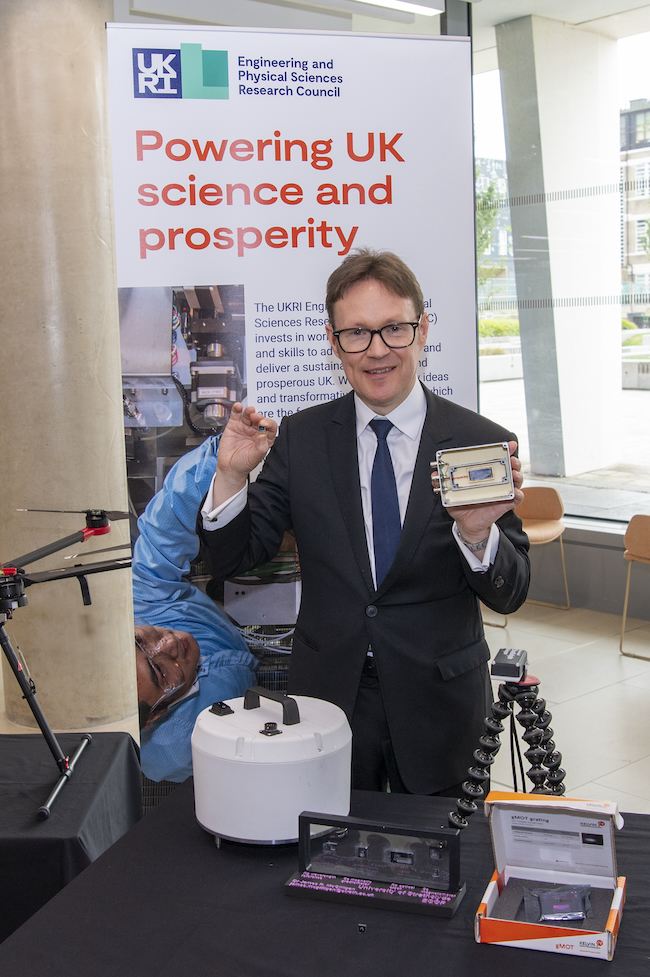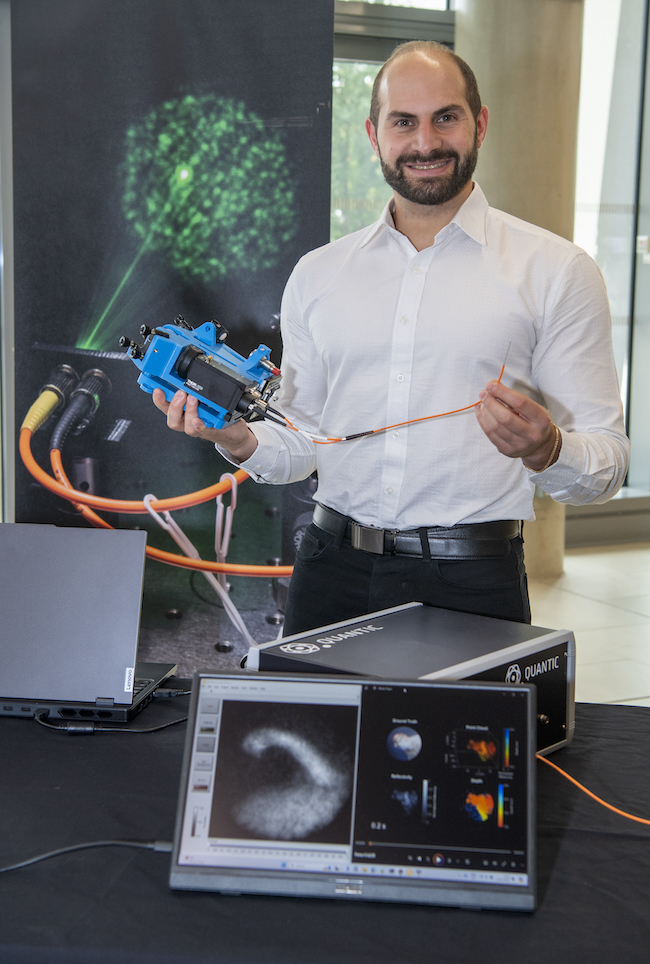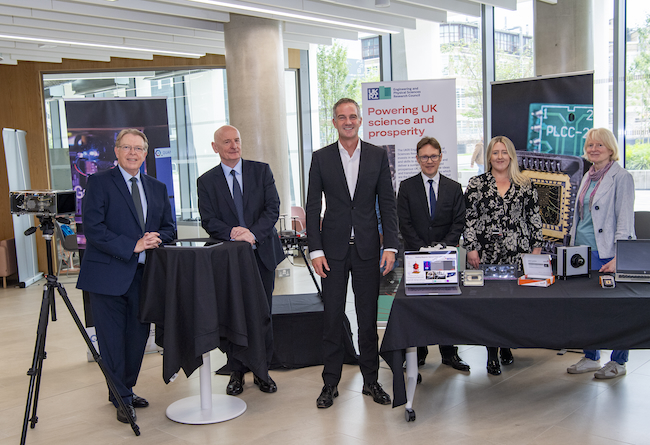University of Glasgow set to play key roles in new quantum hubs
Published: 26 July 2024
University of Glasgow researchers are playing leading roles in two of five new quantum technology hubs announced today.
University of Glasgow researchers are playing leading roles in two of five new quantum technology hubs announced today.
The hubs will ensure that the UK fully benefits from the potential of quantum technologies in areas ranging from healthcare and computing to national security and critical infrastructure.
Science Secretary Peter Kyle announced the new hubs, which are being supported by a £160 million investment, today following a visit to the University of Glasgow’s Mazumdar-Shaw Advanced Research Centre.

Mr Kyle, the Secretary of State for Science, Innovation and Technology, said: "We want to see a future where cutting-edge science improves everyday lives. That is the vision behind our investment in these new quantum technology hubs, by supporting the deployment of technology that will mean faster diagnoses for diseases, critical infrastructure safe from hostile threats and cleaner energy for us all.
“This isn't just about research; it's about putting that research to work. These hubs will bridge the gap between brilliant ideas and practical solutions. They will not only transform sectors like healthcare and security, but also create a culture of accelerated innovation that helps to grow our economy.”
Professor Douglas Paul, of the James Watt School of Engineering, is principal investigator of the new UK Hub for Quantum Enabled Position, Navigation and Timing (QEPNT). It aims to deliver quantum technologies which will be key for resilient position, navigation and timing systems for use in transport, finance, communication systems, national security and critical national infrastructure.
Professor Miles Padgett, of the School of Physics & Astronomy, is co-principal investigator of the UK Quantum Technology Hub in Sensing, Imaging and Timing (QuSIT), led by the University of Birmingham. It aims to overcome barriers to quantum sensing, imaging and timing to allow us to see the invisible, with applications in health such as quantum brain scanners to investigate dementia, and cameras to detect gas leaks and hidden objects.
The hubs are delivered by the UKRI Engineering and Physical Sciences Research Council (EPSRC), with a £106 million investment from EPSRC, the UKRI Biotechnology and Biological Research Council (BBSRC), UKRI Medical Research Council (MRC), and the National Institute for Health and Care Research (NIHR).
Industry collaboration is a key element to all of the hubs, which leverage significant cash and in-kind contributions from partners worth more than £54 million.
Quantum technologies harness quantum physics to gain a functionality or performance which is otherwise unattainable, deriving from science which cannot be explained by classical physics such as Newton’s laws of motion or thermodynamics.
The UK Hub for Quantum Enabled Position, Navigation and Timing aims to develop quantum technologies which will be key for national security and critical infrastructure and sectors such as aerospace, connected and autonomous vehicles (CAVs), finance, maritime and agriculture.
These include atomic clocks and LiDAR sensors, which use light to measure range, which will be able to provide resilient positioning, navigation and timing. Smaller, lighter quantum-enabled devices developed at the hub could find new applications in sectors including roads, railways and underground transport, where they could help improve navigation systems by replacing current GPS positioning technologies.
They could also enable improved indoor navigation on mobile devices, and upgrade the positioning systems in submarines, allowing them to operate for months without surfacing to reconnect with satellites.

Professor Douglas Paul said: "Much of the UK's critical infrastructure relies on the accurate time, direction and speed obtained from signals from global positioning (GPS) satellites. Currently, connections to those satellites are vulnerable to disruption through technical problems or deliberate malicious actions like signal-jamming.
"If those connections are lost for any reason, it would have a huge impact on key industries like energy, finance, communications and transport, causing an estimated economic loss of a billion pounds a day until service is restored.
"This new hub will support the development of new and improved forms of atomic clocks, quantum gyroscopes and quantum accelerometers. Those technologies, integrated into portable and affordable future devices, will help reduce our reliance on satellites by providing new ways to locally measure position, navigation and timing.
"Unlike current technologies, they will work indoors, underground and in all weathers, helping to bolster the UK's national security and offering new applications for industry."
QEPNT will be supported by researchers from Imperial College London and the Universities of Bristol, Cambridge, Edinburgh, Loughborough, Strathclyde, Heriot-Watt, Queen’s University Belfast and Warwick.
The UK Quantum Technology Hub in Sensing, Imaging and Timing aims to overcome the key research barriers to quantum sensing, imaging and timing being used at scale.
This will allow us to see the invisible, with demonstrations in sectors as diverse as healthcare, infrastructure, transport and security. Quantum brain scanners will enhance investigation of dementia and epilepsy. Quantum microscopy will measure biomarkers for cancer diagnostics. Quantum clocks will enhance radar systems to allow better use of future airspace. Quantum cameras will detect gas leaks and hidden objects. Quantum sensing of gravity and magnetic fields will increase resilience and capacity of critical infrastructure.
The hub will also work closely with industry to develop skills and people, creating the leaders of tomorrow. QuSIT will create a pathway to widespread use and manufacture of quantum technologies, accelerating economic and societal benefits.
QuSIT will bring together expertise from the UK Quantum Technology Hub in Sensing and Timing, the imaging hub QuantIC, and the wider academic community.

Professor Miles Padgett is principal investigator of QuantIC, which is based at the University of Glasgow. He said: “I’m pleased to be lending my support to QuSIT, which will build on many of the technologies developed at QuantIC over the last decade to take forward new developments at the cutting edge of quantum imaging. These include a new type of endoscope the width of a human hair, which could make medical imaging less uncomfortable for patients.
“QuSIT will play an important role in helping to maintain the UK’s position at the forefront of quantum technologies, and help to translate innovative research into valuable new sensing, imaging and timing products.”
QuSIT is a collaboration of expert physicists, engineers and data scientists from the Universities of Birmingham, Glasgow, Bristol, Durham, Heriot-Watt, Imperial, Nottingham, Southampton and Strathclyde, as well as the British Geological Survey and NPL.
EPSRC Executive Chair Professor Charlotte Deane said: “Technologies harnessing quantum properties will provide unparalleled power and capacity for analysis at a molecular level, with truly revolutionary possibilities across everything from healthcare to infrastructure and computing.
“The five Quantum Technology Hubs announced today will harness the UK’s expertise to foster innovation, support growth and ensure that we capitalise on the profound opportunities of this transformative technology.”

The new hubs continue the work of the UK National Quantum Technologies Programme. Now in its tenth year, the partnership of more than £1 billion between government, academia and industry, fast-tracks quantum knowledge from laboratory to wider society and economic impact.
First published: 26 July 2024
<< July

